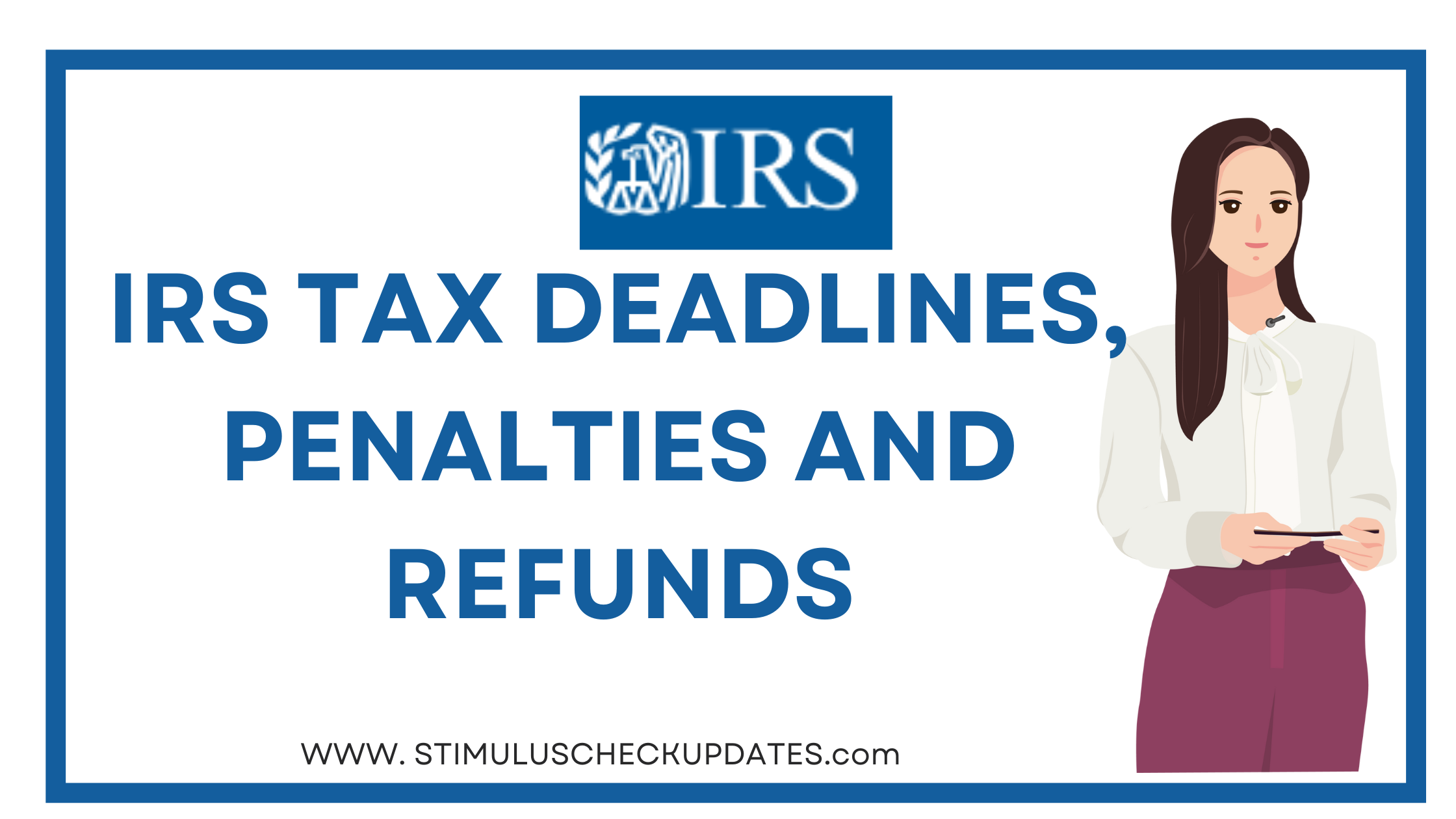IRS Tax Payment Deadlines and Penalties
“If you file your taxes and realize that you owe some money to the IRS for last year, then again — make sure to adhere to the tax payment deadline,” said Forrest. In most cases that deadline is April 15. There are some exceptions, like if April 15 is on a weekend or federal holiday — In those cases, the deadline falls to the first business day thereafter. “The date may vary, however in any case, the cost is important — penalties will apply if no longer paid on time,” he mentioned.
Not paying what you owe on time, too, will induce the IRS to charge interest and penalties on that amount. These fees also compound every day, so even if you’re a few days overdue, you can get hit with hundreds of dollars by the time your garnishment order goes to court. Because the penalties for paying your taxes later can pile up faster, it is a smart idea to make sure you’re able in order to pay all of them on time.
What If the IRS Is Late in Issuing Refunds?
“If the IRS is delayed in releasing refunds, they [typically] compensate taxpayers for interest on late funds,” Steber says.
Many individuals have asked, does the IRS get penalized for taking too long to send your money? The IRS, unlike taxpayers, isn’t penalized for delays. Nonetheless, under some circumstances, the IRS may be forced to pay interest on tax refunds that have been held up.
IRS Refund Issuance Timeline
As a general guideline, the IRS tries to get electronic tax returns that are filed electronically processed and approved in 21 days or less. The time frame for this again can depend on multiple factors:
Mistakes on your Tax Return: Errors like wrong Social Security numbers and missing information will cause processing to be postponed.
The provision of incorrect or incomplete bank account information for direct deposit.
Returns submitted on paper generally take longer to process compared to electronic submissions.
If a delay is caused by taxpayer errors, the IRS is not obligated to pay interest on the delayed refund. However, if the tax return is free of errors, the IRS is expected to issue the refund within 45 days. If this period is exceeded, the IRS must pay interest on the overdue refund, starting from the day the return was received.
Interest on Delayed Refunds
In situations where the IRS owes a refund due to an overpayment, and the refund is significantly delayed, the agency is required to pay interest. For example, if there is an overpayment in 2023 and the refund is delayed, the interest rate applied through September of that year is 8%. While most taxpayers prefer to receive their refunds promptly, this interest can provide a small financial benefit if there are delays.
Checking the Status of Your Refund
If more than 21 days have passed since you electronically filed your tax return, you might be eager to know the status of your refund. Fortunately, the IRS provides a tool called “Where’s My Refund” that allows taxpayers to check the status of their refund.
To use this tool, you will need:
- Your Social Security Number: This is essential for verifying your identity.
- Your Tax-Filing Status: Indicate whether you are single, married filing jointly, married filing separately, head of household, or qualifying widow(er).
- The Exact Amount of Your Refund: This figure helps to locate your specific tax return in the IRS system.
The “Where’s My Refund” tool can provide an update as long as it has been at least 24 hours since you electronically filed your taxes. If you filed your return on paper, you might need to wait up to four weeks to receive an update.
Reasons for Refund Delays
While the IRS generally processes refunds promptly, several factors can cause delays. Understanding these can help set expectations and alleviate concerns:
- Errors in Tax Returns: As mentioned earlier, inaccuracies or incomplete information can slow down processing.
- Review for Accuracy: The IRS may take extra time to review returns for accuracy, especially if there are discrepancies or complex items.
- Verification Processes: Returns that claim certain credits, such as the Earned Income Tax Credit (EITC) or Additional Child Tax Credit (ACTC), may require additional verification.
- Fraud Prevention Measures: The IRS employs various measures to prevent fraud, which can sometimes result in delays as returns are scrutinized more thoroughly.
- Backlogs: During peak filing times or in years with significant changes to tax laws, the IRS may experience backlogs that slow down processing.
Steps to Expedite Your Refund
To minimize the chances of delays, consider the following steps when preparing and submitting your tax return:
- File Electronically: E-filing is faster and more accurate than paper filing.
- Double-Check Your Information: Ensure that all information, including Social Security numbers and bank details, is correct.
- Use Direct Deposit: Opting for direct deposit rather than a paper check can speed up the receipt of your refund.
- Submit Early: Filing your return early in the tax season can help avoid delays caused by backlogs.
Interest on Overdue Refunds: A Closer Look
When the IRS fails to issue a refund within the stipulated 45-day period, it is required to pay interest. This interest starts accruing from the day the IRS received your return until the day the refund is issued. The interest rate is subject to change quarterly and is pegged to the federal short-term rate, which the IRS adjusts accordingly.
In 2023, for instance, the interest rate on delayed refunds is 8% through September. This rate is quite favorable compared to traditional savings accounts or other low-risk investments, offering a silver lining for those experiencing refund delays.
Real-Life Implications of Refund Delays
For many taxpayers, receiving a refund is a significant financial event, often used to pay down debt, make essential purchases, or bolster savings. Therefore, delays can be stressful and inconvenient. However, understanding that interest will be paid on significant delays can provide some consolation.
In 2020, during the COVID-19 pandemic, many taxpayers experienced substantial delays in receiving their refunds due to unprecedented processing backlogs and staffing issues at the IRS. The interest paid on these delayed refunds was a welcome relief for many, demonstrating the IRS’s commitment to compensating taxpayers for undue delays.
The IRS plays a critical role in the U.S. tax system, balancing the collection of taxes with the issuance of refunds. While taxpayers face penalties and interest for late payments, the IRS also has mechanisms in place to compensate for delayed refunds under specific circumstances. By understanding the processes and timelines involved, taxpayers can better navigate the system, minimize delays, and ensure that they receive any interest due on late refunds.
If you find yourself waiting for a refund beyond the typical processing time, rest assured that tools like “Where’s My Refund” provide up-to-date information, and the IRS is obligated to compensate for undue delays. As you prepare your taxes each year, taking steps to ensure accuracy and timely submission can help avoid delays and the associated stress.
Ultimately, while the IRS strives to process refunds promptly, it’s reassuring to know that interest will be paid on significant delays, providing a small financial benefit for the inconvenience. By staying informed and proactive, taxpayers can effectively manage their tax obligations and expectations.

